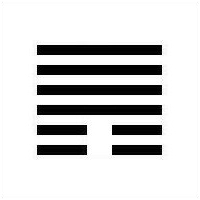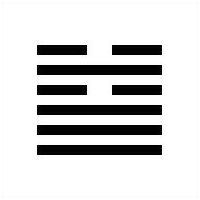Look, it cannot be seen – it is beyond form.
Listen, it cannot be heard – it is beyond sound.
Grasp, it cannot be held – it is intangible.
– Lao Tsu
And we are here as on a darkling plain
Swept with confused alarms of struggle and flight
Where ignorant armies clash by night
– Matthew Arnold
Hexagram 33 called Retreat is partly about bad situations. The I Ching advises withdrawal, but carefully and thoughtfully. There might be an inequality of power, or someone disturbing your balance, such that you must disengage. This applies in philosophical martial arts.
In Aikido in Everyday Life, Terry Dobson and Victor Miller describe how movement corresponds to social relating. They use geometry to explain conflict. Fighting back is like two triangles with opposing points. You must acknowledge relationship, place, time, and spirit. If you have a gentle spirit, and most of us are not fighters, that’s a disadvantage.
Withdrawing from conflict is represented with the attacking point of a triangle facing the opposite direction. You turn the other way and escape, but your rear side is undefended. A circle is facing the point of attack with discussion. Sometimes that’s possible, but often it isn’t. Doing nothing is meeting an attack with a solid square if they can’t harm you. Deception is when you spin an attacker around with a circle. Aikido – the way of harmony – is when you blend your circle with their triangle and resolve the problem. It’s idealistic, but an interesting philosophy.
In Aikido and the Dynamic Sphere, Westbrook and Ratti say the goal is “a higher and more consciously constructed unity” where “Aikido begins to emerge quite clearly as a discipline of coordination, with dominant emphasis upon a unified and harmonized personality.” Similar ideas occur with Chinese arts but I like the Japanese exposition. The I Ching is philosophically related. Self reflection, with outer action, both of them important.
Civilisation has evolved beyond the structural exploitations of feudal conflict, monarchic rule and theocratic control. We are sceptical, sophisticated, more knowing. Larry Schoenholtz considers this advance in New Directions in the I Ching. He uses the term suspension as a description of embedded existence. Thus suspending ourselves:
Through value-action philosophies is of incredibly recent vintage. Suspension by itself had always done just fine. The web, the nest, drives and instincts – even conditioned learning patterns – take care of themselves, no questions asked. The unconscious bursts…of prereflective life were the automatically guaranteed bridges of existence. There was no fuss and no mess about choices and systems – just a lot of tooth and nail, with particular blends of strength, chance and endurance determining the outcome. But with the (alleged) dawn of reflection, the automatic became somehow replaced by a restless and relentless search for psychic bridges.
Psychic bridge is a curiously accurate expression. The insight we need is not part of society. The Retreat of hexagram 33 is when you don’t engage with physical or social conflict because it wastes energy, or you are disadvantaged. But you do it skilfully, retaining power, thus “the superior man keeps the inferior man at a distance, not angrily but with reserve.” The lower trigram is Mountain which means stopping and controlling the greater force above, protecting softness below. The third line is critical, where you encounter the outer environment. The internal or nuclear trigrams repeat the idea, with the gentle influence of Wind penetrating the hardness above.

Hexagram 33 also represents something beyond social and physical interaction. The Wilhelm text is conducive for this reflection or “value-action” philosophy. He was an unusual person for his time recognised by Carl Jung as:
A truly religious spirit, with an unclouded and far-sighted view of things. He had the gift of being able to listen without bias to the revelations of a foreign mentality, and to accomplish that miracle of empathy which enabled him to make the intellectual treasures of China accessible to Europe…he could not help recognizing the logic and clarity of Chinese thought… it had overwhelmed him and assimilated him.
The Jungian outlook, and Taoism, acknowledge the principle of retreat in relation to the entirety of society. In the I Ching, retreat means not engaging with “inferior” behaviour because the situation will escalate, degrade, and entrap. It also means something greater.
Conversation is thus sometimes infused with bad energy. The internet is full of unpleasant interaction which I refer to here. It’s not weakness, but strategic withdrawal when “voluntary retreat brings good fortune to the superior man and downfall to the inferior man.” If you have the wisdom, a detractor loses if they don’t listen. Wilhelm advises “success lies in being able to retreat at the right moment and in the right manner.”
Retreat is also a spiritual idea in relation to limited and unstable materiality. “When nothing is done, nothing is left undone” is paradoxical Tao Te Ching advice in regard to movement and stillness. The outside changes, but you find a still centre in meditation. Retreat is physical when you sit in a quiet room, subtle when you withdraw from thoughts, called citta or mind stuff in Buddhist philosophy.
In hexagram 33, the fifth line is a strong ruler (yang line in a yang place) resonating with a weak yin in the second place. Sometimes we receive (yin) if we don’t have the power or insight we need. In The Taoist I Ching this is called borrowing strength. It might be a book, person, or even random encounter. Sometimes when I’m walking, I hear words as if they are intended for me. “I’ve walked past many times but never knew it was here” was in regard to a park while I was reflecting on unnoticed information.
In Lectures on the I Ching Wilhelm describes connectivity in relation to the Receptive (receiving) trigram:
Completeness of life is possible only in fellowship. No man can complete an enterprise alone and unassisted; the completion of any task demands such fellowship. The artist too, needs the community to complete a work of art; indeed, he perhaps more than anyone else. But fellowship does not necessarily mean that we associate with neighbour X or neighbour Y, in whose company we find ourselves. Rather, fellowship can extend over centuries and millennia.
What he’s thinking of is the I Ching and related philosophy although it also applies with Nietzsche, Shakespeare, Seneca. Whatever you find which inspires, guides, and illumines.
Retreat is important but not a culmination. If you sit and meditate, questions arise about how and why you do it. I pondered this subject, browsing the I Ching, and hexagram 5 caught my attention. It’s a beautiful hexagram, the opposite to effort, Water above Heaven signifying rain we want to descend:
When things are still small, one must not leave them without nourishment. Hence there follows the hexagram Hsü (Waiting / Nourishment). Hsü means the way to eating and drinking. The connection between the two meanings of the hexagram—nourishment and waiting—lies in the fact that we must wait to be nourished. Nourishment depends on heaven and the rain. It does not lie within the power of man.

The connection with Retreat is clear: “Waiting means holding back” and not reacting. “Danger lies ahead” so you must be aware of it. “Being firm and strong, one does not fall into it” and “the meaning is that one does not become perplexed or bewildered” observing inferior energies.
“Waiting in the meadow” Wilhelm advises “It furthers one to abide in what endures.”
I write like this is a magazine column. With research, references, and a lot of time. If you like it, perhaps you would support me.
